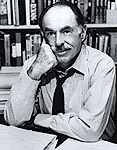
Public Event: A Personal Journey through the New Digital Media Landscape (Without Footnotes)

All scholars and members of the general public are invited to attend the Lawrence K. Grossman NCIS keynote address, "A Personal Journey through the New Digital Media Landscape (Without Footnotes),” presented by NCIS in conjunction with the International Festival of Arts & Ideas
The keynote speech opens the 16th NCIS conference, Traditions & Transitions: Independent Scholars & the Digital Landscape. Grossman will be recounting some of his own experiences trying to make sense of the new digital information age and its ability to serve the public good, focusing especially on its effect on democracy and education.
Nowhere and at no time in history have we been confronted with such vast changes in information technology coming at us so fast. How can we make sure the public interest will be served?
Lawrence K. Grossman will talk about the special responsibility that scholars have, to take the initiative and fight for enlightened regulatory policies that will encourage the widest possible public access, openness and transparency of information.
Lawrence K. Grossman is the former president of PBS and NBC News, and currently serves as Vice Chair and co-founder of the increasingly influential “Digital Promise,” the National Center for Research in Advanced Information and Digital Technologies. Digital Promise was passed by Congress and signed into law by President George W. Bush, and launched by President Barack Obama in 2008, and has since taken a leading role in transforming American education, lifelong learning and skills training for the digital age. Read more about Mr Grossman's career in the article below.
Lawrence K. Grossman, Renaissance Man
By Piri Halasz
Lawrence K. Grossman, who will be delivering the keynote speech at the NCIS conference at Yale University in June 2015, is a Renaissance man. He has excelled in advertising, marketing, promotion, teaching, writing, and the top-level administration of both commercial and nonprofit broadcasting, but his current principal undertaking is his most ambitious yet.
As vice-chair and co-founder of the increasingly influential “Digital Promise,” the National Center for Research in Advanced Information and Digital Technologies, he is being instrumental in enhancing the possibilities for high-level educational, scientific and cultural digital content, as well as extending digital facilities to a far wider range of users.
This, however, is only his latest exploration of new media, for he has long been attracted to relatively untried fields in the communications industries. He entered network television back in the 1950s, when the industry was still in its infancy.
As Grossman recalled, in an illuminating interview conducted in 2001 by Harry Kreisler of the University of California’s Institute of International Studies, television in the ’50s offered sophisticated and experimental programming, primarily catering to upper- and middle-class viewers-- a demographic that made up the majority of television owners in these early years.
Similarly, Grossman joined public television in the 1970s, when its potential was only beginning to be tapped.
The first two decades of his adult career were spent in advertising, promotion and marketing as opposed to the creation of editorial content. A native of Brooklyn, NY, he became interested in journalism in high school. After graduating from Columbia, he went to work for Look magazine, but the only job he could get was in the promotion department.
Recognizing the increasing importance and popularity of television, he then switched over to CBS. He continued to be involved in advertising and promotion, but focused on CBS News, where the stars were Edward R. Murrow, Fred Friendly and Howard K. Smith--a distinguished roster. By 1962, NBC had hired Grossman away to become the head of their advertising department, and once again, as he told Kreisler, those were “the days of Chet Huntley and David Brinkley, when NBC News became dominant.”
He also recollected that during this Golden Age of television, news departments were much more conscious of their responsibilities. “There was “a government policy that required a certain amount of public service in order to hold station licenses,” he said, “and that was seriously felt—perhaps not as serious as it should have been, but nonetheless, still that way.”
Between 1966 and 1976, Grossman was president of his own media, public relations and advertising company, Lawrence K. Grossman, Inc. Its blue-chip list of clients included the Ford Foundation, PBS, the National Association of Broadcasters, the Ladies’ Home Journal, and the United Negro College Fund, among others.
During this period, he also occupied the Frank Stanton First Amendment Chair at Harvard’s Kennedy School of Government for a year. Later on, in 1990, he became senior fellow and visiting scholar at Columbia’s Gannett Center for Media Studies.
In 1976, he received an opportunity that he had long coveted--an executive job that would permit him to direct what today would be termed, “content.” He became president of PBS, and stayed for eight years – beefing up its public affairs programming and going to satellite distribution. The latter was an especially radical decision at the time, but necessary because he wanted to televise the Senate confirmation hearings on Jimmy Carter’s Cabinet.
Many local public TV stations resisted carrying the hearings because they themselves were licensed to school boards and other educational institutions, and had contracts to carry children’s programming, such as Sesame Street and Mister Rogers, at the same time. But Grossman’s chief engineer had told him that with satellite transmission, more than one program could be transmitted simultaneously, therefore allowing the local stations to choose. For this reason, Grossman ensured that PBS adopted satellite transmission—before any of the commercial networks.
In late 1983, Grossman was invited by Grant Tinker, president of NBC and an old friend, to become president of NBC News. It was the fulfillment of a life-long dream, but, to judge from how Grossman expressed himself to Kreisler, also deeply disenchanting.
TV was now a mass medium, with the emphasis on entertainment, often of an unsophisticated nature. Network news had neglected its commitment to public service, as both CBS and NBC were being taken over by outside corporations or individuals who were more concerned with boosting their company’s stock prices than with upholding journalistic standards.
This attitude was being made painfully clear by the slashing of news budgets. At NBC this was directed by Jack Welch, chief executive of G.E., which in 1986 gained control of RCA, NBC’s parent company. Grossman seems to have done what he could to resist these budget cuts. In 1988, Grossman left NBC.
Public television, as he explained to Kreisler, has its own set of problems -- the difficulty of organizing a whole series of stations to act in concert and the perennial shortage of funds forces repetitive program scheduling in order to attract memberships.
Never daunted, Grossman set his sights on a new medium of communication, still in its formative years and therefore still (hopefully) capable of bringing the public new and more elevated cultural, educational and scientific coverage. This, of course, was the Internet, and way back in the 1990s, when a lot of people were still not yet very aware of it, he began to plan for its future.
Initially, this planning took the form of two books. The first was The Electronic Republic (Viking,1995), in which Grossman laid out the effects that recent innovations in telecommunication--including television, the fax machine, the Internet, e-mail and interactive computers--had already had on the political process. He suggested that these developments had already contributed to a more participatory democracy.
The second book, written with Newton Minow, former chairman of the FCC and PBS, is Digital Gift to the Nation: Fulfilling the Promise of the Digital and internet Age (The Century Foundation, 2001). In it, the authors called for a national trust to develop, explore and realize the potential of digital communication for elevating levels of public participation and culture.
Thirteen years later, after a determined campaign, this “national trust” has now become a reality: “Digital Promise,” the National Center for Research in Advanced Information and Digital Technologies, founded in 2008 and based in Washington, D.C. and California.
Though it has not yet managed to receive the full quotient of government funding that its founders had originally hoped for, it has attracted a sterling set of philanthropic foundations and corporate partners to make up the difference—among them, the Bill and Melinda Gates Foundation, the Carnegie Corporation, the John D.and Catherine T. MacArthur Foundation, Apple, Gallup, and McGraw-Hill Education.
As may be seen from its website, “Digital Promise” is engaged in a multitude of projects. Some of the most recent, we all hope, may be mentioned in Grossman’s keynote address, titled “The Tale of a Sometime ‘Independent’ Scholar,’ With and Without Footnotes in the Digital Age.”
Follow Piri Halasz's blog, From the Mayor's Doorstep: http://pirihalasz.com for art criticism, art comment, and occasional politics.
